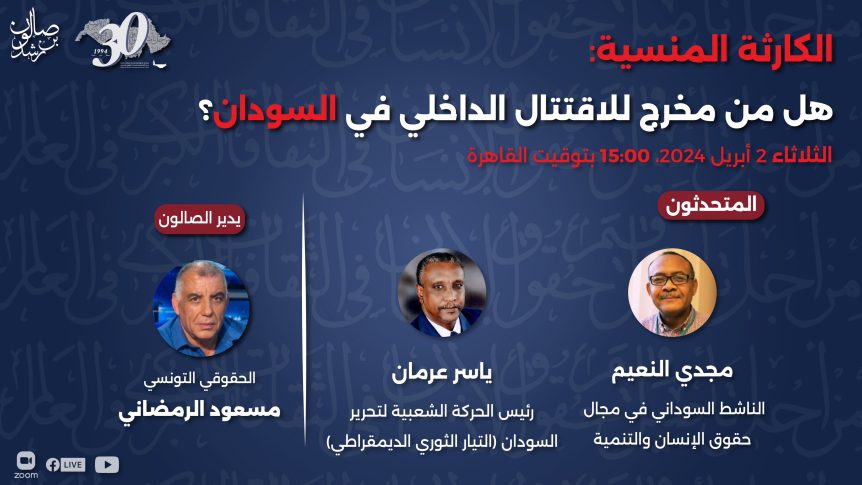On 2 April 2024, the Cairo Institute for Human Rights Studies (CIHRS) hosted a seminar as part of the monthly activities of Salon Ibn Rushd, titled ‘The forgotten catastrophe: Is there a way out of internal fighting in Sudan?’ The seminar hosted Sudanese politician Yassir Arman, head of the Sudan People’s Liberation Movement – Revolutionary Democratic Current, and Sudanese rights defender Magdi El-Naiem, Secretary-General of the Sudanese Observatory for Human Rights, and moderated by Tunisian human rights activist Messaoud al–Romdhani, former Executive Committee member of EuroMed Rights. The seminar focused on dimensions of the escalating catastrophe in Sudan and prospects for returning to civilian rule. Questions and discussions were raised about the grim challenges facing the Sudanese people today, reasons for the political elite’s failure to address the crisis, and the role of regional and international interventions in fueling the conflict.
Magdi El-Naiem began the discussion by addressing the horrific reality and suffering of the Sudanese people as a result of the ongoing conflict. El-Naiem noted, ‘Most parts of Sudan are the scene of daily violations.’ El-Naiem added that Al Jazirah region in central Sudan is witnessing the most turmoil at the present time, as one of the most densely populated regions that includes over 2,000 villages and cities. The region has witnessed horrific violations since its invasion and siege by the Rapid Support Forces in mid-December 2023, El- Naiem explained, including rampant looting, escalating killings, and forced displacement of residents. Following aerial bombardments, Darfur has witnessed major loss of life and infrastructure and a rise in arbitrary arrests, and West Darfur has witnessed atrocities amounting to war crimes and crimes against humanity. Yassir Arman described these horrific violations, which have resulted in the largest wave of displacement the region has ever known. He estimated that 11 million people have been recently displaced from Sudan, in addition to the looming threat of famine that is pushing the population further towards displacement and migration. According to Arman, the city of Khartoum has witnessed a wave of displacement that has reduced its population from eight million citizens to one and a half million people according to the latest estimate. The city continues to face widespread looting in civilian neighborhoods and state centers, and the collapse of health services and judicial facilities.
Arman noted that there are continuous attempts by the democratic and revolutionary forces to create an anti-war front, but at the same time these attempts face contradictions and divisions among the revolutionary forces. Arman considered that the main issue is how to create a relationship between stopping the war and at the same time completing the December Revolution. Arman added, ‘Without state control over violence through the presence of a professional, non-politicized national army that reflects the diversity of Sudan, we will not be able to achieve development, democracy, or citizenship.’ El-Naiem stressed, ‘The decision to stop the war lies within the hands of those who are fighting,’ and further described them as the inheritors of the bureaucracy of the previous regime, both its civil and military sides. The civilian side is represented by the Islamists or those who took over what remained of the Islamic movement, while the military side is represented by the army leadership. This bureaucracy owns the decision to stop the war, and thus owns the bulk of mapping the future. Unfortunately this bureaucracy is at the center of the current impasse, which needs innovative and creative solutions from all Sudanese political forces.
Arman noted that the will of the fighting fronts alone cannot stop the war, as there is a need for the convergence of three combined wills: national will, regional will and international will. Arman underscored that the war in Sudan cannot be stopped without drying up the sources of regional and international support for the two parties to the conflict in Sudan, which includes ending the financing of the war. El-Naiem focused on the involvement of many regional and international parties in the war, noting that ‘the Rapid Support Forces receive military and non-military aid and supplies from the UAE,’ and military supplies from Libya, with the coordination and satisfaction of the Russian government. El-Naiem added that meanwhile, the government is practicing ‘….complex political and security games through rapprochement with Iran, which is evident in Iranian weapons that have affected the balance of power on the ground.’ Some of the militias in Sudan were trained in neighboring countries, El-Naiem continued, and some of them originally belong to neighboring countries. Some reports indicate, with a lack of sufficient evidence, that there is an Egyptian and Ukrainian role in the conflict.
Regional and international intervention in Sudan will not be stopped by Security Council Resolution No. 2724, despite what appears to be an attempt to crystallize international and regional resolve to stop the war. However, the resolution lacks mechanisms for implementation on the ground, according to Arman. The resolution represents a weak decision issued as a result of the abstention of one of the countries that has the veto; for a strong decision to be reached, El-Naiem underscored, there must be a consensus among the countries that have the right to veto. The interests of the Sudanese must be promoted, the war ended, and every violator or aggressor held accountable, all of which is ‘considered impossible at the present time or in the perspective future,’ according to El-Naiem.
Watch the full seminar
Share this Post

